Home » The Quirky Camper’s Guide to Buying a Campervan
The Quirky Camper’s Guide to Buying a Campervan
So you’ve decided to buy a campervan? Well you’ve come to the right place. Quirky Campers is one of the most popular places to sell a campervan, sellers from all over showcase their vans on our site, so you have the the very best selection to choose from. We have a massive range of campervans for sale on our sales pages from private sellers. Everything from unique conversions created by our Quirky Approved Converters, to basic conversions, to motorhomes, there really is something for everyone. Whether you’ve decided to go for a fully converted van or something halfway there, there will be something for you on our dedicated campervan sales page.
Buying a campervan is an exciting and rewarding experience, but it can also be confusing and overwhelming at first. To help you make the right choice, we’ve created this useful guide to help you along with the process. Including important documents you should see and recommended checks you can get, to make sure your potential van is safe and roadworthy. Follow our guide to be sure of a smooth van sale, so you can get on with your new vanlife, exploring the freedom of travel it brings.
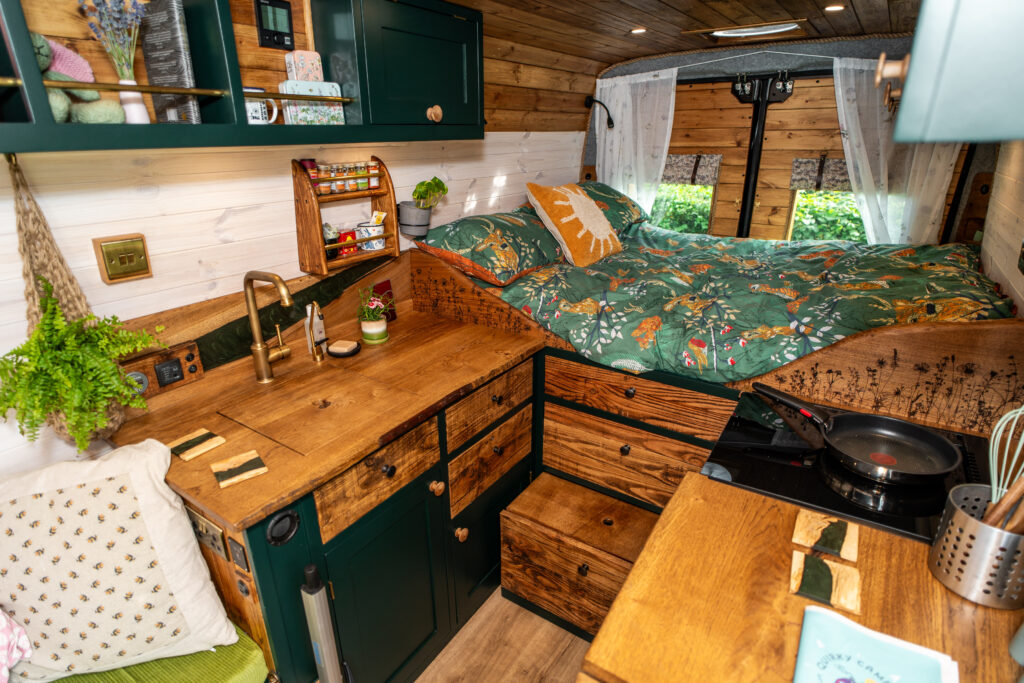
Choosing The Right Van For You
Tempting as it is to jump right into those sales listings and drool over the beautiful vans on offer, it’s always a good idea to have an idea of what you want to buy first.
Budget
When buying a campervan your first step is to establish your budget. The first obvious question to ask yourself is how much are you able to spend to buy the van itself, and will you be giving yourself enough budget to make any aesthetic or mechanical changes you may wish to make afterwards? Are you looking for something new or used? A brand new conversion may have less problems in the long run, but will be considerably more expensive, as will a professionally converted van vs a self-built van. You will also need to consider the cost of running the van, insurance and road tax, which will be more expensive on a campervan than your everyday car.
Things to consider when establishing your budget:
- Insurance costs
- Services and repairs – particularly if the van is only part converted
- Breakdown services (RAC/AA)
- Fuel costs
- Van storage – parking
- Van Age & Mileage – a lower mileage van is usually preferable, as is a more recent van, but these do affect the cost. Factor in how much it might cost you in the long run in repairs and maintenance if you go for an older vehicle or one with high mileage as they are likely to have more wear and tear.
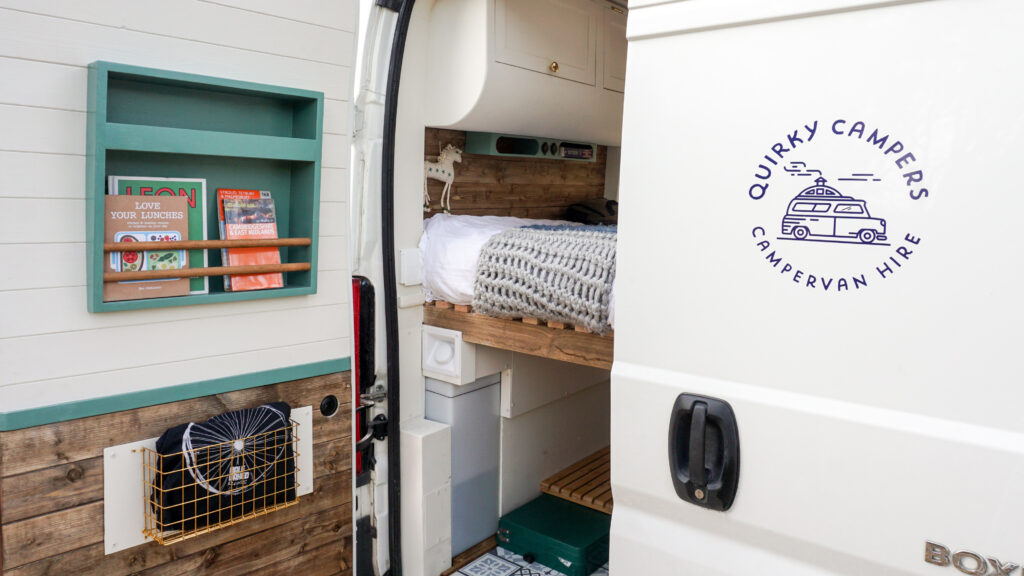
What are your travel plans?
When buying a van it’s important to think about what kind of travel you will be using it for. There will likely be differences in your needs between a van mostly for long weekends or a van for a 6 month cross-European trip, or full time van living. Each of these will have different requirements in terms of space and provisions, if you’re always staying at campsites, a toilet and shower probably aren’t necessary, however if you’re going for off-grid may want to devote more space to solar panels and batteries. If you’re planning on taking some off-roading adventures you may need a smaller, more powerful van, whereas if slow travel and comfort are more your style, a larger van may be more suitable, just bear in mind the size of the vehicle for driving and parking. Considering these questions will narrow down your search considerably.
How many people will be using it?
There are two things to consider when thinking about space for passengers in your campervan. Firstly, belted seats, how many people you need to be belted in seats in the van. Even if you’re not all planning on sleeping more than two, sometimes an extra seat is very useful to bring extra people who want to sleep in tents for a group trip. Not all van seats will be suitable for child seats so if you’re looking for a family campervan do your research first.
Size
Any van larger than 3500kg will need a C1 category licence to drive it. Always check the weight to make sure you don’t end up with a van you can’t actually drive. Also worth considering is where you plan on driving your van, manoeuvring a 7m long van down Cornwall’s winding lanes or through tiny villages in Wales can be more stress than it’s worth if you aren’t used to driving a large vehicle. A smaller van can be just as fun to travel in but still fit in a parking space. Aside from the van size itself, consider the storage you’ll need. You may be able to squeeze your family of four into a smaller van but you’ll still need space for all your luggage and gear, particularly if you want to bring along any equipment for adventures. Some vans are equipped with specialist storage for things like surfboards and other gear – it’s all about how prepared you are!
Try Before You Buy
Hiring out a campervan really is a great idea if you’re not sure about what kind of van style is for you, and we’re not just saying that because we have a spectacular collection of campervans to hire. Trying out a few different vehicles over a few weekends will give you a much better idea about how they actually work, you may find that once you’ve had to make up a bed every night, that you’d rather have a fixed bed, or vica-versa. Save yourself the buyer’s regret and try before you buy! Check out our full range of campervans for hire here.
Electric, Petrol or Diesel?
If you’re your looking for sustainable travel then electric campervans are definitely worth looking into. Electric vans have come on leaps and bounds in the last few years, and we have several electric campervans for hire on our site already, check out our all-electric range to get some ideas. If you’re looking for an investment we also recommend looking into vans that could later be converted into electric, many professional converters are expanding into this field – electric is the future! Alternatively, most second hand vans on the market are diesel, it’s slightly more expensive but a lot more common. If you’re looking for a petrol van you’re probably going to narrow down your search considerably.
Do Your Research
Read plenty of reviews about the different makes and models. Look for reviews and testimonials from owners of the specific campervan models you’re interested in. Consider the resale value as well, some brands and models hold their value better than others.
Ask before you buy
Once you’ve found a van you like the look of on our page, get in touch with the seller. Each sales ad has a contact form (if there’s no contact form on the page the ad has already been sold or expired – sorry!) Don’t be worried about having a good chat with the seller, ask them where they’ve taken the van, what kind of trips it’s been on, any issues they’ve had and importantly why they’re selling the van.
We’d recommend viewing a few different vans before you settle on buying one. This will give you a much better idea of what is out there and the kind of condition vans at a certain price range should be in – comparison is key, it’s easy to fall in love at first sight with what looks like a beautiful conversion but try to keep your mind open before you settle on one.
WARNING: We do not inspect the listings for accuracy or check the campervans in person. We have asked sellers to provide evidence of certificates and paperwork however you MUST check yourself that the information provided is present and correct. You will need to exercise normal due diligence when buying any vehicle. Read our tips on choosing a vehicle.
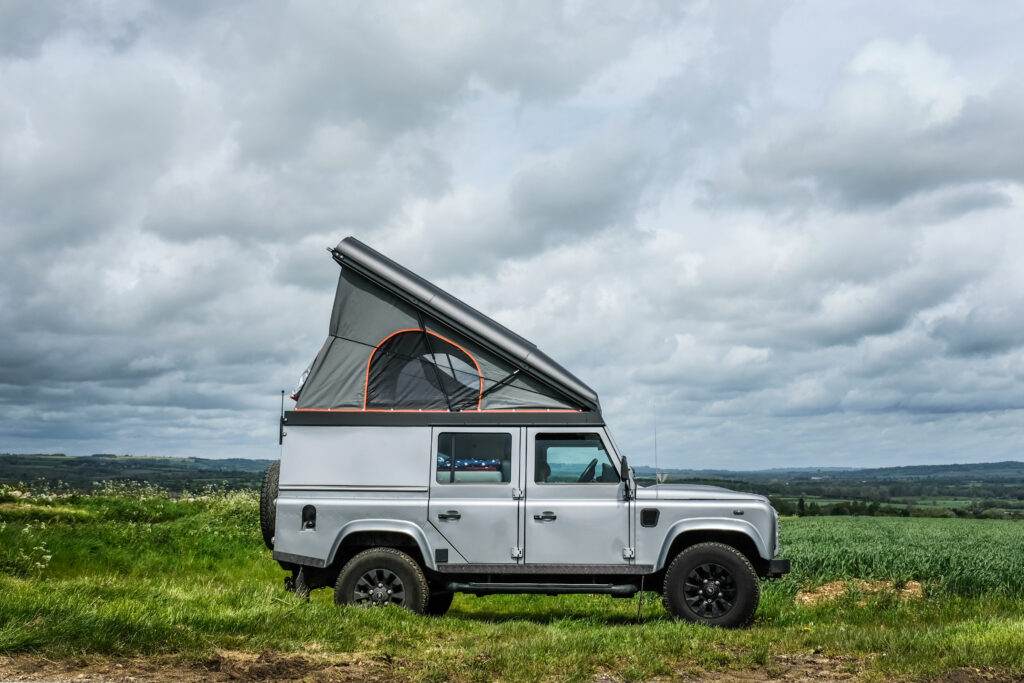
How to buy
What to look out for when viewing your potential van
No matter how glossy and shiny the van may look, if it’s not mechanically sound you’re going to be in for a world of issues and probably footing some big bills. Here are some things to look for to avoid nasty surprises down the road.
Mileage
This is an aspect of buying a lot of people get hung up on, whether to avoid high mileage vans completely and focus on low mileage vans only. The honest answer is that all parts do wear down eventually; all vehicles will need parts replacing due to wear and tear, and higher mileage vans may be cheaper and had a lot of their parts replaced already. That said if there’s over 100k on the metre, it tends to lead to more failures and work needing to be done for the vans MOT, so worth including in your budget. Vans with a mileage of 200k-250k tend to show their use. However, if the van has been regularly serviced and worn down parts have been replaced, it shouldn’t be much of an issue.
Weight
MAM (Maximum Authorised Mass) is the total amount that the vehicle and all of its luggage is allowed to weigh – for example a L3H2 Peugeot Boxer’s MAM is 3500kg. Most vans tend to be under 3500kg MAM, which you can drive on a standard car licence and have a normal MOT, but double check the MAM is what you think it should be, and especially watch out for ambulance and minibus conversions.
Age
As long as the van has been well maintained and hasn’t suffered any major rust, this shouldn’t be a problem. Bear in mind that some components such as timing belts are also age dependent. You’ll tend to get older vans cheaper, but they’ll have older technology.
- Find out how long the seller has owned it, and did they use it much?
- Ask if they did the conversion themselves. If so, how much experience do they have converting campervans? The first conversion always has the most issues: it could be fine, but there is more risk.
Write offs
If a van has been written off in the past this means the vehicle has been damaged but the cost of repairing the van outweighs its market value. Remember, insurance companies look at the total cost of repair including hire vehicles, genuine parts costs.
Cat S (formerly Cat C) is structural damage; these need to be inspected after repair
Cat N (formerly D) is cosmetic damage.
Bear in mind that vehicles are only written off if the damage goes through the insurance company. You might personally scrape a wall and pay to have this repaired privately – if this went through insurance it could have been a Cat N. Any vehicle you purchase may have had body work in the past without you knowing about it.
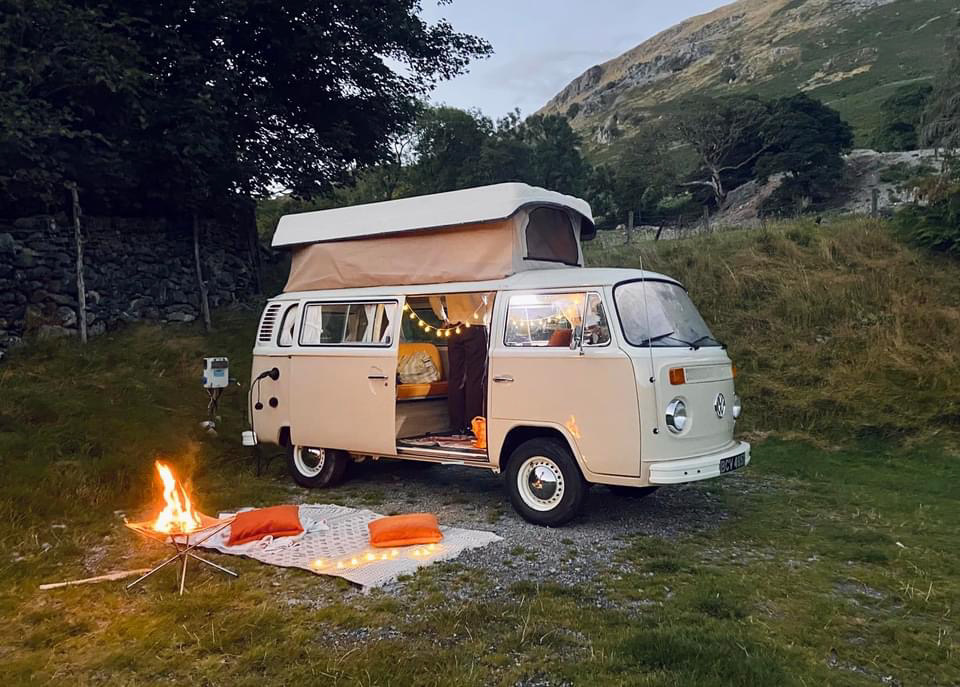
Paperwork
- V5 log book
- Have you checked the MOT history? Check the van’s MOT history on the government website here. In particular, check the odometer readings on successive MOTs to make sure they look correct, that is, the mileage should be increasing regularly.
- Have you checked the service history? The AA have a great guide to how to do so here.
- Safety certificates from the seller, for example Gas safety certificate (a requirement if you’re looking to hire your van out on Quirky Campers), or a habitation certificate.
- Warranties for various items in the van, fridge, oven etc.
- Are all the manuals for all items still with the van and any equipment inside it?
- Does the seller have all sets of keys?
- Check the VIN and the vehicle registration match up.
- Check for outstanding finance and write-offs. You can do this with an HPI check or RAC vehicle history check for under £20.
- Ask to see the service history? Is there a service or serviceable item due, such as the timing belt?
- Have a conversation with them about the reasons they are selling, what history the van has and if there is any damage not shown in the listing.
- There are also downloadable apps (like Vehicle Smart) which can show any recurring issues or anything to look out for in the particular make of van.
Van Exterior
- Do a full 360 of the van, check for issues from every angle.
- Check for any signs of forced entry or tampering which may be an indication of a stolen van.
- Check each panel – are they wonky or damaged, are they all the same colour? This can be a suggestion of repair work done.
- Check underneath the van for leaks, any oil stains on the floor?
- You might need a ladder but don’t forget the roof – check for damages and any potential leaks, this will also give you a good look at the solar panels if they have any.
- Check the suspension.
- Check all the tyres & the spare.
- Do the lights work well and clearly?
- Van seals – as you’ll be spending a lot of time in the van likely in all weathers, you want full waterproofing, check the condition of the doors, windows and roof windows if there are any.
- Check the glass in the windscreen and windows for chips & cracks.
- If the lower part of the van has been painted black, it’s a good indicator that any rust around the sills has been either repaired or just painted over.
- Check for any ripping or bulging in the panels which could point to previous repairs.
- Check the panels line up correctly; if there’s a large gap at one side of the bonnet but a small gap at the other, it could indicate there being some damage in the past.
- Check for any visual rust. Run your hand on the inside of the wheel arches to check there’s no rust starting to build up there. If you can, peek under the side of the van and look for anything that doesn’t look solid.
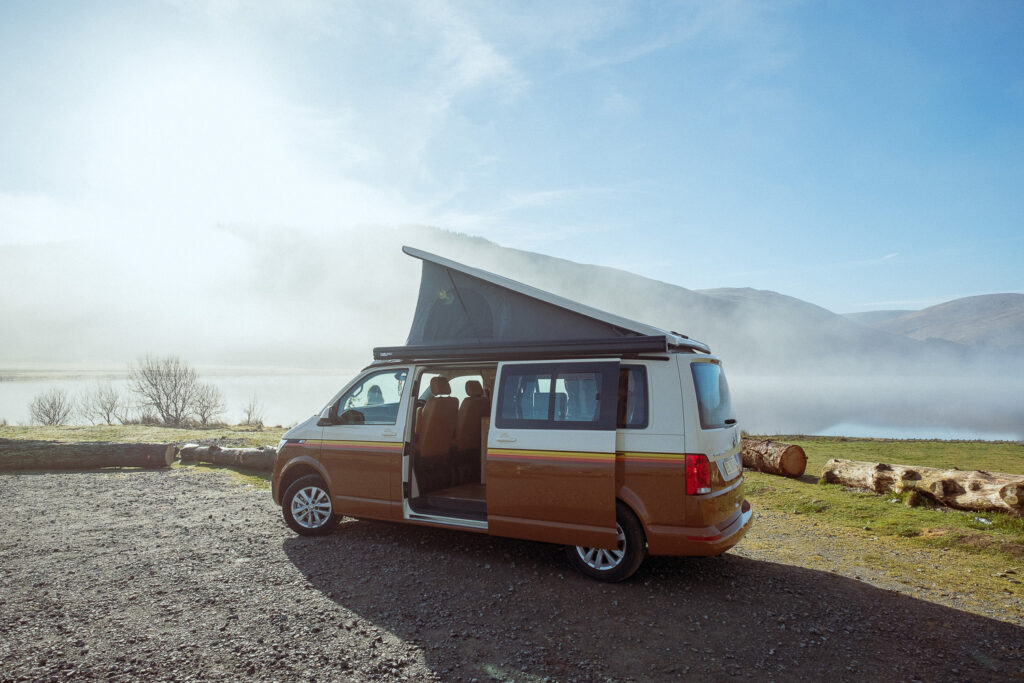
Engine
- When you turn the engine on, are any warning lights showing on the dashboard?
- Does the engine make any noises or stutter?
- Check the fluid levels.
- Check the exhaust.
- Pay a mechanic to check out the van’s engine and ensure it’s not got any major issues if you’re not mechanically minded yourself.
- Start the van a couple of times to make sure the starter motor is working correctly, and be wary of any seller who has the vehicle running when you turn up.
- Listen for any obviously horrible noises when the engine is running; if there’s any crunching or loud tapping / knocking then it could point to something wrong.
- Make sure the coolant expansion tank has either blue or pink fluid inside. If the tank looks really dirty or black on the inside, take the cap off (engine MUST be cold and not running to prevent serious burns) and check there’s no oil mixed in there – again that could point to a blown head gasket.
- Check there’s oil on the dipstick and that there’s no debris which could indicate excess carbon build up.
- Take off the oil filler cap and make sure there’s no white gunk inside the cap – this would indicate there’s moisture getting into the engine. This could be a sign of a blown head gasket, which would be a pretty pricey repair!
- Check for any engine lights on the dashboard or lack of performance when the engine is under load (climbing a hill).
Test Drive
- Take it for a spin, see how you feel driving it
- Check that everything works, from the brakes, the radio down to the windscreen wipers – if it’s in the van – test it
- Does the van drive well, no noises, knocks or vibrating during the drive?
- Try the aircon and heating – these are an expensive fix so let them run for a while making sure there’s no issues or smells
- Listen for any knocks or bangs when going around corners or over speedbumps. Does the steering pull to one side?
- Does it go into gear smoothly?
Interior
- Give it a good whiff – any smell of mould or damp?
- Check the roof, sides and doors for dampness or wet patches which may be signs of leaks
- Damp check – this can either be a check done by a professional or with a damp metre
- Pull out the drawers, turn on all the lights, take a phone charger with you to make sure the plug sockets work, inspect every nook and cranny of the van – the seller shouldn’t mind you doing a thorough check of the whole interior, don’t be rushed into missing something
- Check the water system – particularly if the van comes with a shower or other running water supply
- Look closely at the cabinetry to assess the quality of the craftsmanship (rough edges, sloppy cuts, exposed screws), as they might be indicative of wider issues
Sign offs and recommended checks
- Van electrics system – professional check recommended
- Gas safe certificate – recommended to ensure the set up of hobs/cooking etc. is safe
- Habitation check – not essential but can be useful
- Vehicle history check
- Van inspection – both the RAC and the AA provide a pre sale vehicle inspections for a charge

Making an offer
Once you’ve seen the van, done a test drive and have thoroughly checked everything over it’s time to make an offer. Don’t be scared to offer less than the asking price, if you’ve done your research you should be confident in what the van is worth in comparison to other similar vans. Use online resources to determine the fair market value for the campervan. Don’t hesitate to negotiate the price based on your research and any issues found during inspection. A seller may ask for a deposit before the full amount – always get a receipt for this and get everything in writing.
Personalise and Upgrade
There may be some future improvements in sight for your new van. Plan for potential upgrades or modifications to make the campervan suit your specific needs better.
Join a Community
Connect with others in the Van Life world, by joining online forums or local communities of campervan enthusiasts for advice, tips, and support.
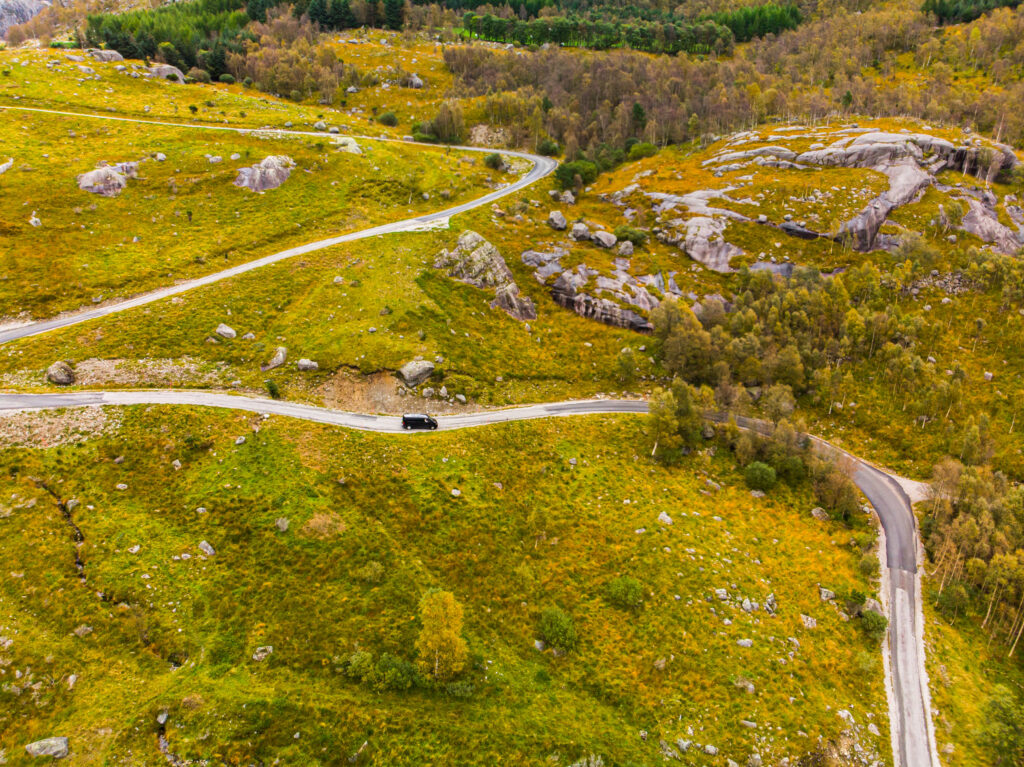
Finally, Enjoy the Journey
Time to hit the road! Once everything is in order, pick a destination and get going, it’s time to get stuck into your new campervan adventure.
Now that you have your perfect campervan, why not fund your dream trip by renting your new home on wheels out with Quirky Campers!
Campervans can be expensive to run and keep – why not come onboard with us and rent out your new campervan, you can see all the FAQs on becoming one of our community here.




